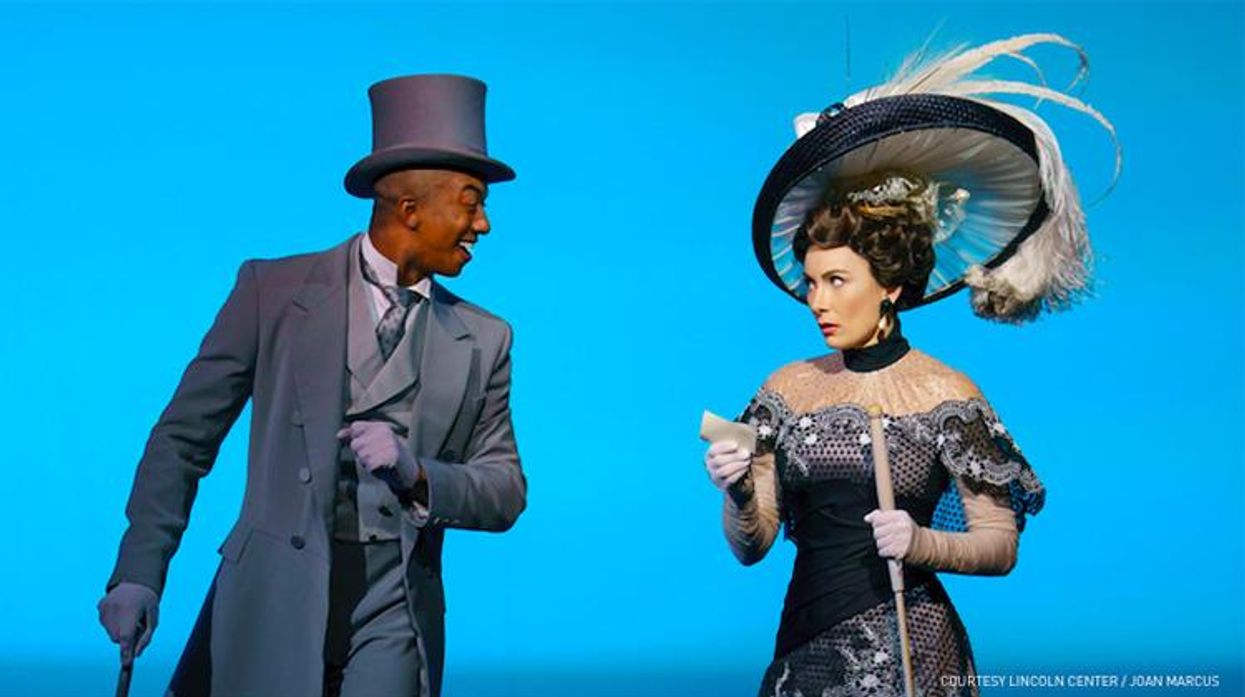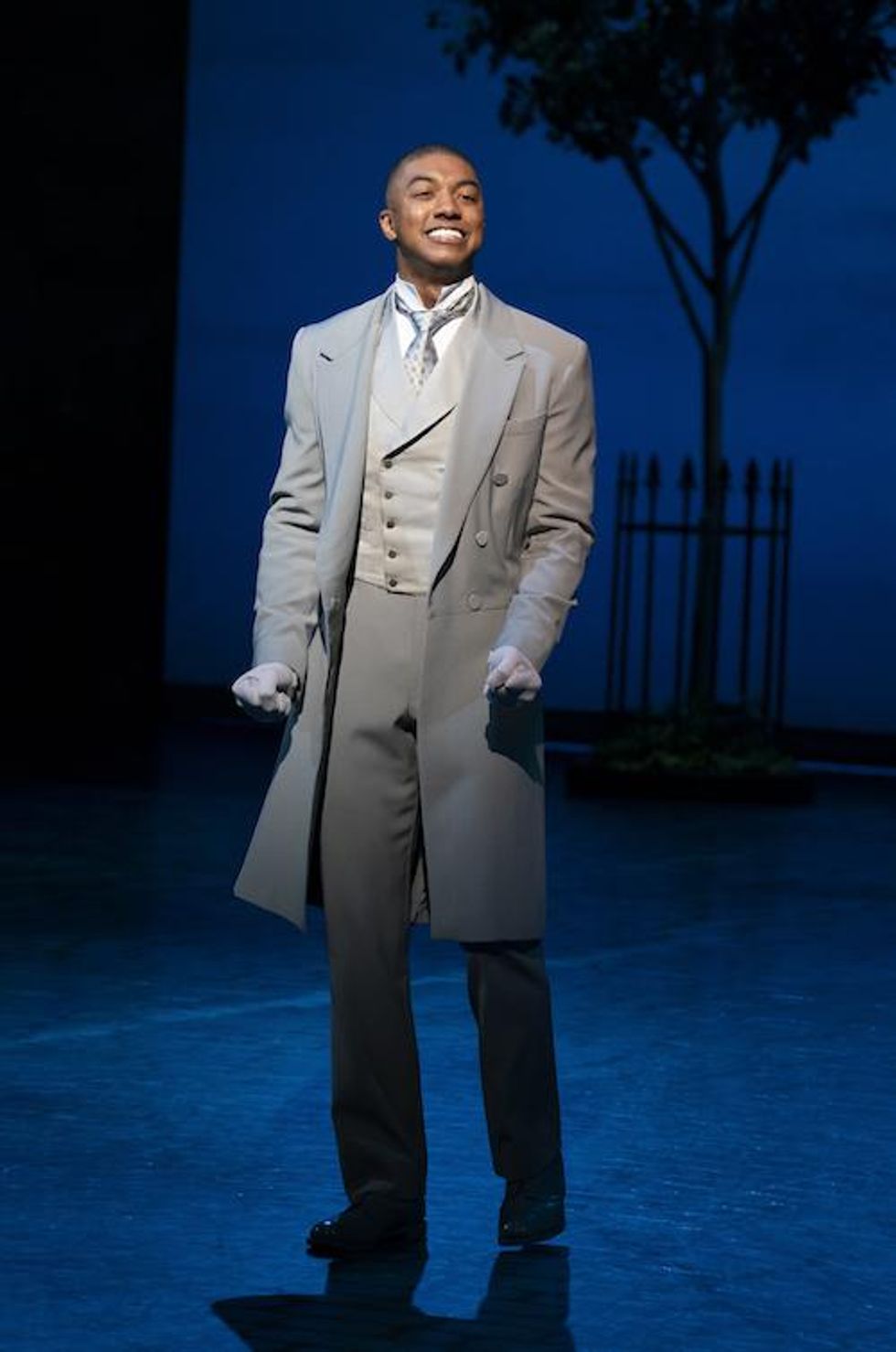Pictured above: Christian Dante White and Laura Benanti
When he was growing up, Christian Dante White wasn't your typical musical theater kid. In fact, acting was far from his mind until it became virtually impossible to ignore. Initially choosing to study opera at Interlochen Center for the Arts in Michigan, he quickly learned "this thing called acting" was written in the stars when, by chance, he sang at an open mike night.
"Everybody freaked out," he recalls of the response to his rendition of a song from the hit show Ragtime. "I was like, I need to do this. I can't stand and sing an aria. I need to do this. That was when the acting bug really hit me."
The gamble paid off. He switched his major and transferred to Circle in the Square Theater School, and he made his Broadway debut in 2010's The Scottsboro Boys. That was followed by roles in The Book of Mormon, Shuffle Along, Hello, Dolly! and most recently My Fair Lady, where he played the highly coveted role of Eliza Doolitle's suitor Freddy Eynsford-Hill, becoming the first out gay Black man to play the part on Broadway. It's a milestone he doesn't take for granted.
"I get to make it my own, sing the song ["On the Street Where You Live"], but also I get to be representation because there aren't many other people of color in the show -- though the show is very diverse," he explains of the latest revival of My Fair Lady, which ended its run in July. "It means something to me to be a person of color and especially a gay person of color as a principal role in this show. I get messages all the time from young students of color and young gay kids saying, 'It's so amazing to see you up there, and I'm so inspired.' That means a lot to me because I used to be that kid."
When My Fair Lady opened on Broadway in 1956, it became an instant classic. The songs, written by Alan Jay Lerner and Frederick Loewe, have seeped into the American psyche, securing the show's place in the musical theater canon. And as with all great classics, its productions have evolved over the decades to represent culture in its proper place and time. This particular production considered the #MeToo era by showing a more empowering perspective on protagonist Eliza Doolitle's situation, one that displays her as more of an opportunist than Professor Henry Higgins, who is teaching Doolittle to speak like a lady so she can rise from poverty.
 Courtesy of Lincoln Center / Joan Marcus
Courtesy of Lincoln Center / Joan Marcus
The ever-changing landscape of theater is evident in this day and age, and so is the demand for diverse representation across all media. In fact, a recent case study about Shonda Rhimes's production company, Shondaland, aimed to discover why her shows resonate so deeply with television audiences. One of the major reasons the study points to is the fact that her Rhimes's shows are ethnically diverse and viewers feel like their lives are being seen in an authentic way.
"I feel it's the same with Broadway," White says, acknowledging the Shondaland study. "I've heard a lot of people say they're upset because now that everything's so diverse, everything's 'ethnic.' But I say to that, you know, we're not on an equal playing field here. Yes, we are getting more diverse, but it's not equal. It's not across the board. Shows they're doing now will have one African-American or one Asian and say, 'OK, we're diverse.' Like, 'We checked off the list and that's progress.'"
The phenomenal success of Hamilton certainly changed the game as far as diversity and breaking down barriers. But as writers and producers are more cognizant of being inclusive in their storytelling, it's also given rise to voices in the theater community -- mainly white actors -- who claim that color-blind casting creates challenges both on and off the stage.
"I 100 percent don't agree with people that say [inclusive casting] is not fair," White explains. "It's not an equal playing field -- whereas [Caucasian actors] have 10 jobs, we're vying for one spot. That's not equal. So the fact that you're upset over my one or two spots or one out of 30 shows that are this diverse or all Black or all Latino or mixed or nonwhite, I can't hear that argument because we're not equal across the board and we're not there yet. We're just getting started. We're really just taking that label off and breaking down that door, so we have more work to do. But I get it. Here's the thing: When you're in New York, everyone wants to work. There are thousands of actors and only a couple of hundred jobs. So of course people are going to be upset when things change. We can even talk about ageism. It's hard out there to be an actor, but we have to just be kind, do our best work, and hope for the best."
White, who cites Audra McDonald and Beyonce as the two biggest inspirations in his life, knows that at the end of the day it's show business, and as audiences change, so must the art, and so must the way in which artists promote themselves.
"It's hard for a new show to sell without a name or star. That's just the world we live in now," he says. "I do think that's tricky. I know that some people have lost jobs because the other [actor] had more social media followers ... but again, that goes back to the business aspect of it. I do think that that's dangerous, but this is a machine. It's a business, and at the end of the day it's about making money. The art is beautiful, and we gotta make money with the art ... but there is danger in that. I know people who've been in 12 Broadway shows, and I know someone who's been in that one show that just got that huge following and now they're more popular because they've got 10,000 followers. And people think, Oh, call him in. They're more in the forefront, but that's just how it is right now."
There's no doubt that the hustle is real, but White is continuing to change the landscape of how audiences view a leading man. The beautiful thing is that he's doing nothing more but being his authentic self. After all, that's all he can do.
His next performance well be his solo concert debut at The Green Room 42 on October 14 at 7pm. As far as the long-term future, White says, "I'm manifesting and being patient and seeing what happens."


 Courtesy of Lincoln Center / Joan Marcus
Courtesy of Lincoln Center / Joan Marcus 

































































Charlie Kirk DID say stoning gay people was the 'perfect law' — and these other heinous quotes